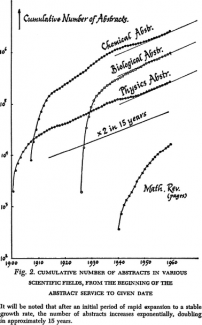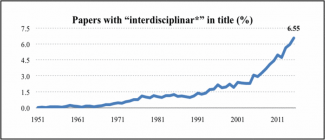In my previous post, I blogged about the challenges facing higher education due to the accelerated rate of technology advancement. Today, I will discuss how fast the growth of human knowledge is.
Knowledge growth
One of the measures of the amount of useful knowledge may be the number of scientific publications. Derek J. de Solla Price proposed this method in the 1960s., and observed a relationship illustrated with the following graph:
The obvious conclusion to be drawn is that the number of publications grows ... exponentially. It takes about 15 years for the number of scientific publications to double, and the trend has been observed invariably since at least 1907. At the beginning of the 20th c., one hundred scientific papers were created per day around the world. Today, that many publications are put out per hour, which in 2065, it will only take a few minutes. This is a perfect illustration of the rate at which we create knowledge. However, higher education does not seem to change at a faster pace. Conveying knowledge during a lecture and verifying how much has been acquired by way of examination still remain at its core. Is this model of education going to keep up with the growth of knowledge?
Dr Janusz Marszlec in a panel discussion during the Innoshare conference emphasized that universities need to build knowledge, but also character and abilities. Professor Wiesław Nowiński pointed out that universities should create an atmosphere that attracts passionate people and provide them with favorable work conditions. Of the same mind is Professor Christine Ortiz ((Massachusetts Institute of Technology) who presented her model of a university during the conference Innowacyjna Europa (Europe of Innovation) in Łódź. According to the Professor, students should be given the opportunity to acquire competences that do not become outdated as quickly as knowledge does. Further, competences can be quickly adapted to rapid changes. She envisions a university without lecture halls or a unified curriculum. Students would work on projects, whereas their contact with teachers (in this case, 'mentors' would be a better word choice) would be determined based on individual needs. That is fairly controversial.
Do we need departments/schools/faculties?
The dynamism of knowledge growth makes it more and more difficult to categorize it. Scholars try to tackle this issue by creating new disciplines: bioinformatics, biomimetics, econophysics ... But such hybrids are ever short lived. It quickly turns out that biology+informatics does not cut it, and that a still more interdisciplinary approach is required. The very term 'interdisciplinary' is on a roll as the graph presented by Sum Wai Yuan Hedren shows.
This begs the question: can traditional university structure take the increasing interdisciplinarity of science and the growing need for interdisciplinary education?
What will have changed by the time you get your degree
I am going to sum up the thoughts I have presented here and in my previous post with a list of simple calculations. Let's assume that a student embarks on a university adventure in 2017, and it's going to take him/her five years altogether to complete his/her first- and second-cycle degrees. The world will significantly change within this time:
-
The amount of information generated by people will increase 20-fold.
-
The number of scientific papers will grow by over 13 million.
-
The number of patents registered in the USA will rise by 1.8 million.
-
If anything akin to Facebook, Uber or Instagram is under development anywhere in the world (and it surely is), it will get at least 350 million users.
In addition, a university graduate will change careers on average 3 times. The task for universities is not only to built knowledge but also to prepare students for the ever changing world by giving them the opportunity to gain relevant competences.
You do not gain such competences during lectures. You develop them by 'learning by doing', which allows to you to better understand who you are, what skills you have, what interests you, and what your values are. When setting out to create a university of the future, it may be worth resorting to the classics, for it was Confucius who said:
"Tell Me and I Will Forget; Show Me and I May Remember; Involve Me and I Will Understand".






